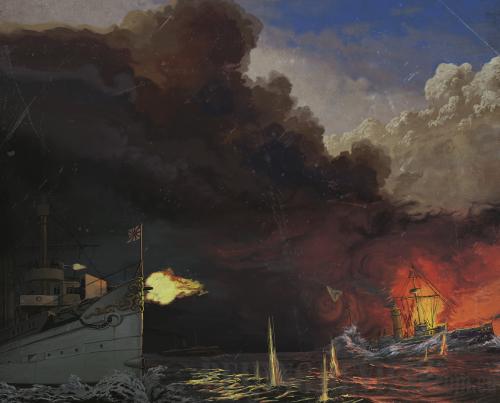|
 |
|
THE TIPPING POINT: An artist's interpretation of the Battle of the Yalu River. The defeat of the Qing Dynasty's largest naval fleet at the hands of the Japanese had a knock-on effect from which China's then Qing Dynasty rulers never recovered (ILLUSTRATION BY CUI XIAODONG) |
This year marks the 120th anniversary of the outbreak of the First Sino-Japanese War of 1894-95, commonly known in China as the Jiawu War. Time has passed, but the trauma of the conflict is still felt by the Chinese people even today.
The war, during which China's then-ruling Qing Dynasty (1644-1911) was defeated, changed the fate of the country. It exposed the dynasty's weaknesses and led to a scramble for concessions by foreign powers in China. In the aftermath, the country spiraled into enduring political instability and turmoil that culminated with the overthrow of the Qing Dynasty.
A halfway reform
Facing crises within and without, China and Japan both chose reform as the road to reviving their respective societies since the 1860s. While Japan's Meiji Restoration's focus was a long-term plan to build Japan into a powerful, modern country, China's equivalent Self-Strengthening Movement existed only to keep the Qing Dynasty alive.
The Self-Strengthening Movement's efforts were centered on military and economic reform, such as introducing Western firearms, industrialization, and creating a modern navy.
"There is only one thing we have to learn from the 'barbarians'—solid ships and effective guns," scholar Feng Guifen (1809-74) wrote in the early 1860s.
The campaign began in 1861, when Prince Gong (1833-98) and Grand Councilor Wen Xiang (1818-76) proposed establishing a new office to direct foreign affairs.
During his dealings with British and French invaders in the Second Opium War (1856-60), Prince Gong came to believe Western weaponry to be superior, and discovered that his Western opponents did not try to hide their military secrets—rather, they openly offered to help China train and equip its army after the Western fashion. Prince Gong concluded that China could accommodate the West and build up its military strength with their help.
Another central figure of the Self-Strengthening Movement was Li Hongzhang (1823-1901), Viceroy of Zhili and Minister of Beiyang. His experience with foreign armies and officers during the suppression of the Taiping Rebellion (1851-64) also opened his eyes to advanced technology of the Western armies in Asia.
In 1863, Li warned that if China did not modernize its military, they would have to face a Japan that had looked and would again look to pray on China with its new technology. He asserted that China had to strengthen itself by adopting modern Western firearms and ships to face the coming challenges.
Li also instigated earlier attempts at educational reform. He originally supported the proposal for an educational mission in the United States. In 1872, the first group of Chinese boys aged 12-14 were sent to Hartford, Connecticut. In the following years up until 1881, a total of 120 Chinese students were sent in four installments.
Despite all these achievements, historians suggest the Self-Strengthening officials' preoccupation with firearms, ships and machines and their negligence of Western political systems and culture limited the scope of the Self-Strengthening Movement and ultimately contributed to its failure.
| 